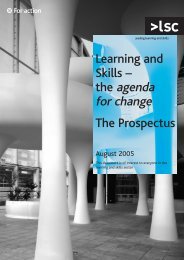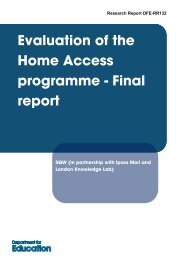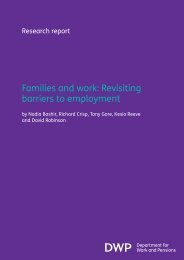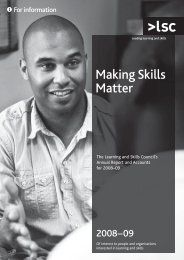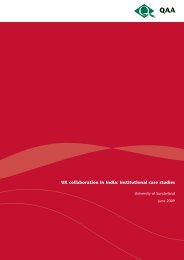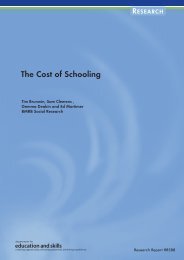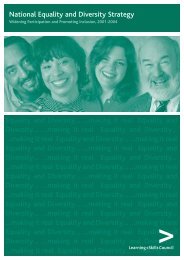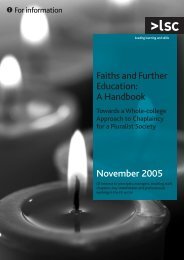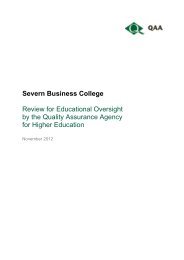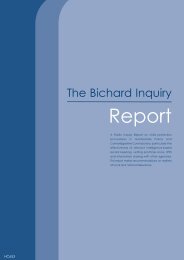Recognising and recording progress and achievement in non ...
Recognising and recording progress and achievement in non ...
Recognising and recording progress and achievement in non ...
Create successful ePaper yourself
Turn your PDF publications into a flip-book with our unique Google optimized e-Paper software.
<strong>Recognis<strong>in</strong>g</strong> <strong>and</strong> Record<strong>in</strong>g Progress <strong>and</strong> Achievement <strong>in</strong> Non-accredited Learn<strong>in</strong>gExecutive SummaryThe Learn<strong>in</strong>g <strong>and</strong> Skills Council (LSC) has been work<strong>in</strong>gwith the Department for Education <strong>and</strong> Skills (DfES),the Office for St<strong>and</strong>ards <strong>in</strong> Education (Ofsted)<strong>and</strong> the Adult Learn<strong>in</strong>g Inspectorate (ALI) to developa broad <strong>and</strong> coherent set of measures of success thatcan properly recognise <strong>and</strong> celebrate all learners’<strong>achievement</strong>s across the learn<strong>in</strong>g <strong>and</strong> skills sector,<strong>and</strong> gauge the success of providers.<strong>Recognis<strong>in</strong>g</strong> <strong>and</strong> <strong>record<strong>in</strong>g</strong> <strong>progress</strong> <strong>and</strong> <strong>achievement</strong><strong>in</strong> <strong>non</strong>-accredited learn<strong>in</strong>g (RARPA) is a prioritymeasure. It is the first to be piloted, evaluated <strong>and</strong>applied. RARPA applies to <strong>non</strong>-accredited learn<strong>in</strong>g<strong>and</strong> provides a way of recognis<strong>in</strong>g <strong>and</strong> <strong>record<strong>in</strong>g</strong>learners’ success <strong>in</strong> this context.The pr<strong>in</strong>ciples of the staged process <strong>and</strong> the benefitsof the approach for quality-assur<strong>in</strong>g learn<strong>in</strong>g will<strong>in</strong>fluence other aspects of the developments with<strong>in</strong>the New Measures agenda.RARPA started as an <strong>in</strong>itiative to raise the qualityof <strong>non</strong>-accredited teach<strong>in</strong>g <strong>and</strong> learn<strong>in</strong>g.It has developed <strong>in</strong>to a priority new measure underSuccess for All, reflect<strong>in</strong>g the significance of this work<strong>and</strong> the contribution RARPA has made to the NewMeasures programme.Non-accredited learn<strong>in</strong>g is typically found <strong>in</strong> adultprovision, often part time, <strong>and</strong> <strong>in</strong> formal <strong>and</strong> <strong>in</strong>formallearn<strong>in</strong>g contexts. RARPA should also be appliedto other areas of <strong>non</strong>-accredited learn<strong>in</strong>g, <strong>in</strong>clud<strong>in</strong>glearn<strong>in</strong>g by people with learn<strong>in</strong>g difficulties <strong>and</strong>/ordisabilities where the primary learn<strong>in</strong>g goals maynot be accredited outcomes, <strong>and</strong> Entry to Employment(E2E) provision, where personal <strong>and</strong> social developmentis a key outcome. RARPA is not <strong>in</strong>tended to be appliedto full-time 16-19 provision, for which other newmeasures are be<strong>in</strong>g developed <strong>and</strong> piloted for valueadded<strong>and</strong> distance travelled.RARPA supports the LSC’s aims <strong>and</strong> those of its keypartners, recently described <strong>in</strong> Quality Improvement<strong>and</strong> Self-assessment (LSC, May 2005), by provid<strong>in</strong>gthe approach for quality-assur<strong>in</strong>g <strong>non</strong>-accreditedprovision. The guidance requires, as a m<strong>in</strong>imum,that providers’ self-assessments <strong>in</strong>clude judgementson all areas, accredited <strong>and</strong> <strong>non</strong>-accredited,<strong>and</strong> evaluate all learners’ <strong>achievement</strong>s.The key themes of RARPA are that:• the learner is at the centre of the RARPAapproach• the purpose of <strong>in</strong>troduc<strong>in</strong>g RARPAis to enhance the learners’ experience• the application of RARPA should be fitfor purpose• the approach, both <strong>in</strong> the staged process<strong>and</strong> the quality assurance of learn<strong>in</strong>g,is to be unbureaucratic• the approach should complement <strong>and</strong> <strong>in</strong>tegratewith exist<strong>in</strong>g processes for quality assurance<strong>and</strong> learner <strong>record<strong>in</strong>g</strong>• the staged process is mapped to the newCommon Inspection Framework (CIF)<strong>and</strong> should encourage effective self-assessment<strong>and</strong> evidence of effective learn<strong>in</strong>g processesat <strong>in</strong>spection (see paragraphs 49 to 53 below).The actions that providers need to take are to:• ensure the quality assurance processes,self-assessment <strong>and</strong> quality improvementplann<strong>in</strong>g <strong>in</strong>clude all provision, accredited<strong>and</strong> <strong>non</strong>-accredited• review teach<strong>in</strong>g <strong>and</strong> learn<strong>in</strong>g strategiesfor <strong>non</strong>-accredited learn<strong>in</strong>g to ensure thatthe staged process can be applied to teach<strong>in</strong>gpractices <strong>in</strong> a way that ensures the stagedprocess is be<strong>in</strong>g applied to the benefitof learners• review their quality assurance systemsto ensure that sufficient <strong>in</strong>formationis collected <strong>in</strong> a suitable way to allow selfassessmentdecisions to be taken• review data collection systems to ensure thatthese are fit for purpose <strong>and</strong> not unnecessarilybureaucratic• develop, as necessary, self-assessment report<strong>in</strong>gprocesses for 2005-06 to cover all provision,accredited <strong>and</strong> <strong>non</strong>-accredited• implement RARPA for E2E provision fromSeptember 2005.iii



